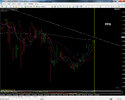Fraud can occur at any size and at any level, but I would expect a firm claiming to have over $200 million in client funds to at least hire an accounting company that has an office with more than a single employee.
Point well taken; but the underlying fraud here at PFG required "intent" on the part of the corrupt firm. Any and all accounting firms, big or small, generally hold themselves at "arms length" from "transactional responsiblity". Accountants continuously encounter inscrutible, contradictory, and obfuscated transactions executed by their clients. They know their clients as involved in complex business activities it may only dimly understand, and have no expertise in, desire, nor responsibility to understand. They are not hired to judge the quality or appropriateness of business desicions made by the management that hired them. The accountant is not there to be its client's critical auditer. Rather, it is always placed in the position of a subserviant bookkeeper, tax advisor/preparer and business strategist. This is just and right. The accounting firm is (and should only be) held responsible for verifiying the books are true, accurate, and balanced; that the client and vendor accounts are real, the business is paying its bills, its taxes, its employees, and their benefits; and it is accurately booking and collecting its payables and receivables.
.
As in the case of Enron and Arthur Andersen, this beast of an energy futures trading firm and its accountant were both huge entities, publicly listed and traded corporations. However, this proved no deterrent to intentional fraud and malfeasance on the part of Enron, without the knowng participation of Arthur Andersen. This fraud was made possible because through averice, the fraudsters at Enron had become supremely self-convinced they would never be held responsible for their actions. They possessed no scruples, and cared for no one but themselves.
.
Simultaneously, the arrogant acccounting firm held no true belief or concern that its own integrety and survival could ever be threatened by any errors or oversights it might commit in the process of certifying the financial statements of any one fat cat firm it was hired to represent. Even though they may have had no grand understanding of the overall effect the various off-balance sheet transactions they reported would have on the solvency of Enron as a whole, Arthur Andersen's reputation and thus it's own business viability were completely destroyed through actions from which it did not even profit.
Don't you think that if Arthur Andersen had knowledge of and a proper understanding of the true condition of its client Enron, it would not have dropped them like a hot potato before being sucked down by the actions of a single fraudulent client firm?? Face it, they were as clueless and overfed as the pension fund managers that bought and held the Enron stock.
.
PFG simply exploited the gaping wide hole in the competence of its regulators to perpetrate a fraud for as long as it could. I am certain even the individual perpetrator(s) driving the fraud himself couldn't really believe how easily, and for how long, he was able to extend the sham. He placed his head within his own noose, and just sat there laughing and crying for 20 years, awaiting the trap-door below to spring open.
This type of activity can only be found and prevented if the responsibility for integrety is placed directly in the chain of custody!
No accounting firm can (or should) ever be held to the standard of audit integrety, as it is just a hired paperwork gun; a tool of the firm's management, and shall always be subserviant to the firm itself. Management deserves the right to hire a friendly firm on its own behalf to help it structure it's tax and capital planning; to analyze and recommend stategies without fear, as a part of routine business. On he other hand, only the Custodial Bank thru its Federal Reverve Regulation, and the individual Securites firms' DSRO overseer should be held responsible for the integrety of its charges, and be held truly adequate to enforce and uphold the expected standards.
I submit again, it is the custodial and fiduciary firms that must be held financially responsible to their respective customers, exclusively through the chain of custody via the requirement to "know your customer". Trust can only be restored through the knowledge that oversight is being rigidly, insightfully, and instantaneously implemented by the Regulator, ultimatley held responsible to the taxpayer through it's Legal and yet to be expanded SIPC insurance structure.
Respectfully,
AI

